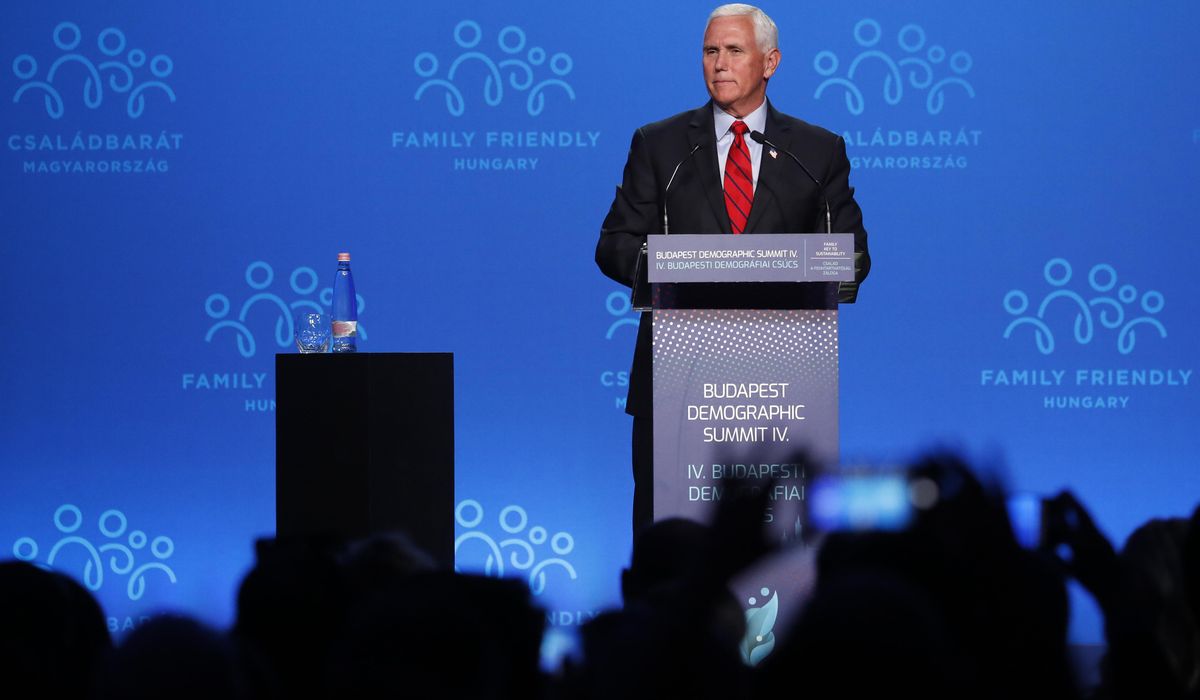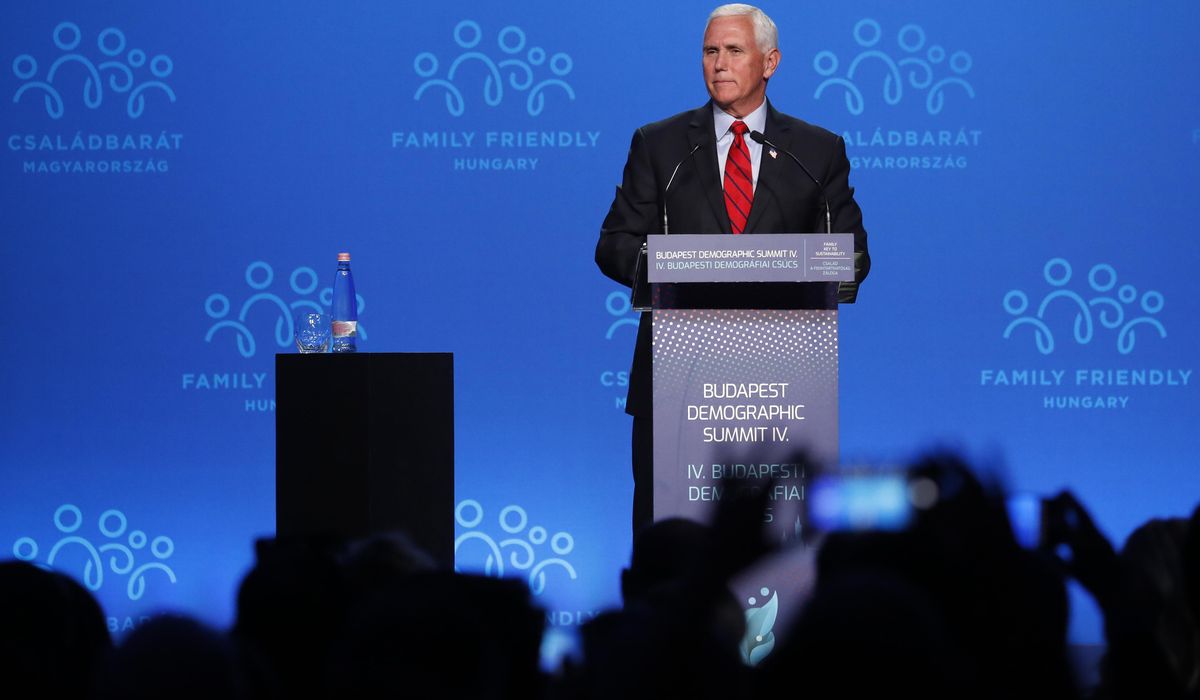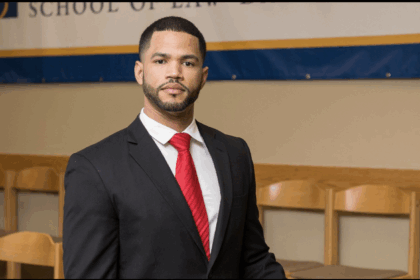
Former Vice President Mike Pence said the Biden administration should apply “maximum pressure” on North Korea but keep open the possibility of talks with its leader Kim Jong-un, replicating the approach President Trump used to engage the dictator.
“The truth is that weakness arouses evil,” Mr. Pence told dignitaries from South Korea and Japan at a virtual gathering Saturday.
He also stressed that America must firmly stand up for allies across Asia in the face of China‘s growing assault on freedom, democracy and human rights.
The former vice president focused mainly on North Korea during a keynote speech hosted by “Think Tank 2022,” an initiative sponsored by The Washington Times Foundation and the Universal Peace Federation (UPF). This global nongovernmental organization operates in general consultative status with the United Nations Economic and Social Council.
Mr. Pence also warned the Biden administration against reverting to so-called “Strategic Patience” on North Korea — a reference to years of waffling by the former Bush and Obama administrations. During their tenures, the Kim regime built up its nuclear weapons and intercontinental ballistic missile (ICBM) arsenals.
Mr. Pence credited the Trump administration with making historic progress on North Korea by declaring early on “that the era of strategic patience was over.”
“We brought a maximum pressure campaign from the outset of our administration and we proved that progress toward peace is possible when America is strong,” he said, asserting that in similar fashion to “historic” strides the Trump administration made on another front — the Abraham Accords in the Middle East — the approach on North Korea policy showed that “peace followed strength.”
“Few people imagined that they would see the leaders of the United States and North Korea sitting down to discuss peace,” Mr. Pence said. “But at the historic summit in Singapore, we showed it was possible, and nuclear testing in North Korea stopped.”
The 2018 Singapore and 2019 Hanoi summits ultimately failed to deliver an agreement for North Korea to relinquish its nuclear weapons arsenal, and talks have since stalled. But the Kim regime has held to a moratorium on nuclear and ICBM tests that Mr. Kim and Mr. Trump agreed to at the onset of the summits — even as Pyongyang carried out other, shorter-range missile tests and provocations over the past year.
“The strong stand taken by our administration, followed by the historic dialogue between President Trump and Chairman Kim Jong-un brought an end to that nuclear testing and to missiles that threaten to begin to resume today, creating destabilization on the peninsula, in the region and the world,” said Mr. Pence.
“With North Korea once again firing missiles, and working to expand its nuclear capabilities, I fervidly hope that the Biden administration displays the same strength of our administration, the strength the world needs, even while continuing to build on the progress we made toward peace,” he said.
North Korea has recently claimed to have successfully tested long-range cruise missiles. And, eye-opening images have purportedly shown the North Korean launch of short-range ballistic missiles from a rail car. The Biden administration has remained largely silent in the face of the provocations, which have rattled U.S. allies South Korea and Japan. Mr. Biden has maintained sanctions against Pyongyang, but has not added to them. The administration has also gone forward with U.S.-South Korean joint military exercises, which have triggered threats of escalation from the Kim regime.
Mr. Pence criticized the administration’s security policy on other fronts, most notably concerning the deadly debacle surrounding the recent U.S. withdrawal from Afghanistan. Still, he stressed that America retains its position as a world leader. “Let me assure you, despite the current American administration’s disastrous withdrawal from Afghanistan, the American people remain absolutely committed to defending our allies in Asia and around the world,” the former vice president said. “America will always be freedom’s greatest champion, liberty’s greatest protector and the military of the United States will remain the greatest force for good the world has ever known.”
Bucking China‘s bullying
Organizers of “Think Tank 2022” have described it as a virtual think tank focused on solutions to major issues in Northeast Asia. Topics ranging from economics and trade to the role of China and the fate of the Demilitarized Zone dividing North and South Korea — a stretch of land that some have suggested as an ideal place for a fifth global United Nations office and a world peace park.
UPF co-founder Dr. Hak Ja Han Moon participated in an event officially launching “Think Tank 2022” in May. Mrs. Moon, the widow of the Rev. Sun Myung Moon, is the leader of the Unification movement that grew from the Unification Church the Rev. Moon, a strident anti-communist, founded in 1954 — a year after the war between North and South Korea was frozen by a U.S.-backed armistice. Mrs. Moon and her late husband devoted their lives to the reunification of the Korean Peninsula and to the promotion of world peace. They founded The Washington Times in 1982.
Mr. Pence, who praised the work of Mrs. Moon during Saturday’s event, focused a portion of his remarks on the importance of dedication to faith. He cited the “encouragement of scripture” at one point. “Let us not become weary in doing good,” he said, “for at the proper time we will reap a harvest if we do not give up.”
In a roughly 30-minute speech, the former vice president also leveled sharp criticism at the communist government in China. He cited what he described as its human rights and trade abuses, the crackdown on democracy in Hong Kong, aggressive military maneuvers in the South China Sea and threats toward the island democracy of Taiwan.
Mr. Pence lamented what he described as Beijing’s general unwillingness to play a constructive and cooperative role with Washington on efforts to get North Korea to relinquish its nuclear weapons built over decades of violations of U.N. Security Council resolutions. China is a permanent member of the council.
“Now more than ever, the free nations of the world must call upon China to respect human rights, democratic principles, the freedom of navigation and do their part to achieve the denuclearization of the Korean peninsula,” he said.
Concerning Hong Kong, he highlighted the case of Jimmy Lai, the 73-year-old entrepreneur, activist and pro-democracy newspaper publisher currently jailed as part of Beijing’s increasing crackdown on what had prior to recent years been a flourishing democracy in the semi-autonomous city-state.
“America and our allies must also continue to stand with the people of Hong Kong,” Mr. Pence said.
“Beijing is continuing to seek to bring Hong Kong to heel and make it just like the rest of China,” he said. “The free world must demand justice for Jimmy Lai and all who are suffering for their commitment to democracy.”
About Taiwan, the former vice president said, “America and our allies in the region must also make it clear that we will stand with the people of Taiwan.”
“China is becoming more aggressive towards Taiwan with each passing day and even this week, China issued a new warning to foreign forces after 28 Chinese warplanes violated Taiwan’s air defense zone,” he said.
While Mr. Pence broadly credited the Biden administration with having “renewed our commitment to support Taiwan,” he stressed that “we cannot stand idle in the face of China‘s aggressive military maneuvers, lest Taiwan soon face the same fate as Hong Kong.”
He also said “freedom-loving nations of the world must demand that China come clean about the origins of the coronavirus.”
A ‘brighter future’
“Think Tank 2022” organizers say future events are expected to feature other high-level dignitaries. In May, the initiative’s launch featured David Beasley, the executive director of the U.N. World Food Program, the world’s largest humanitarian organization.
Saturday’s event featured panel discussions in which former high-level U.S., South Korean and Japanese diplomats exchanged views with Mr. Pence.
Japanese Diet member Yoichi Anami and Retired Vice-Admiral Yoji Koda, the former commander in chief of Japan‘s Maritime Self, were among the dignitaries on the Japanese panel. South Korean National Assembly member Won-shik Shin and former Deputy Minister of Unification for the government in Seoul Hyeong-seok Kim were among those on the South Korean panel.
The American panel featured former House Speaker Newt Gingrich; former Congressman Dan Burton; Christopher Hill, a former assistant secretary of state for East Asian and Pacific Affairs; and Michael Jenkins, the president of UPF International and Chairman of The Washington Times Foundation.
Mr. Pence told the group that “despite the many challenges we face across Northeast Asia, I remain confident that a brighter future is on the horizon for the United States, for the Korean people, our allies in the region and for all who stand strong for freedom and security.”
“During our four years of service in the White House, we reaffirmed America’s commitment to support the Republic of Korea, Japan and all of our allies in the region,” he said. “Peace followed strength, and I believe the unwavering commitment to our common defense and our shared values is the surest pathway to the final and fully verified denuclearization of the Korean peninsula and to bringing about a peaceful unification of Korea within our lifetime.”








